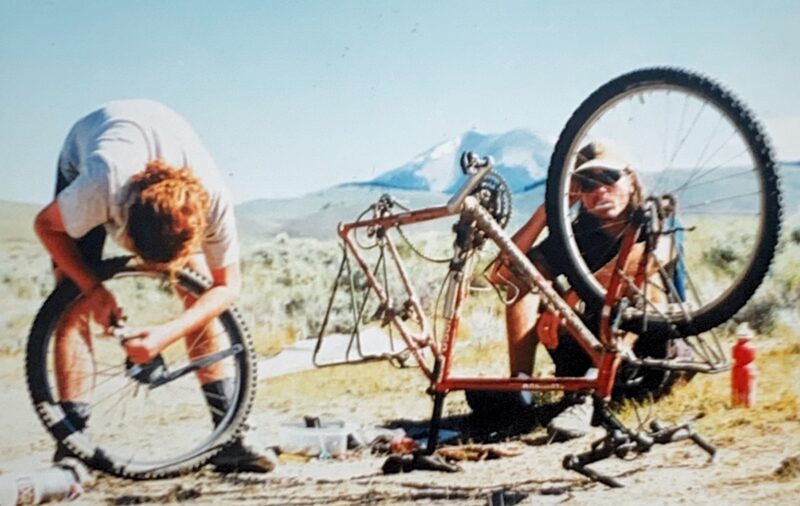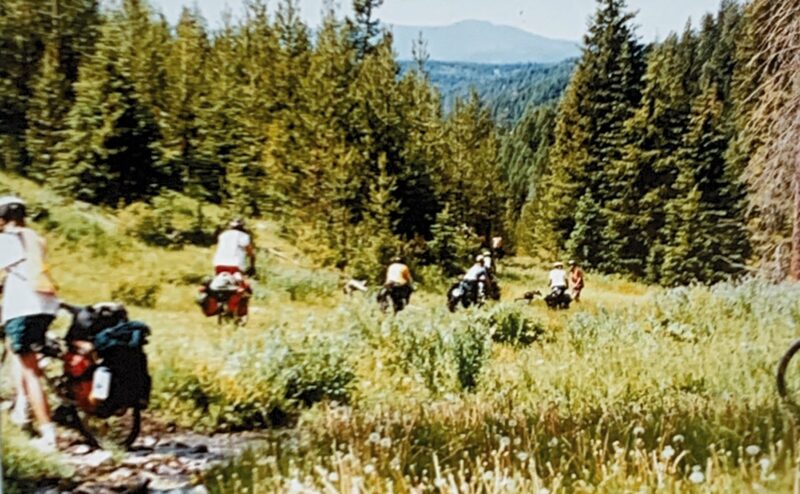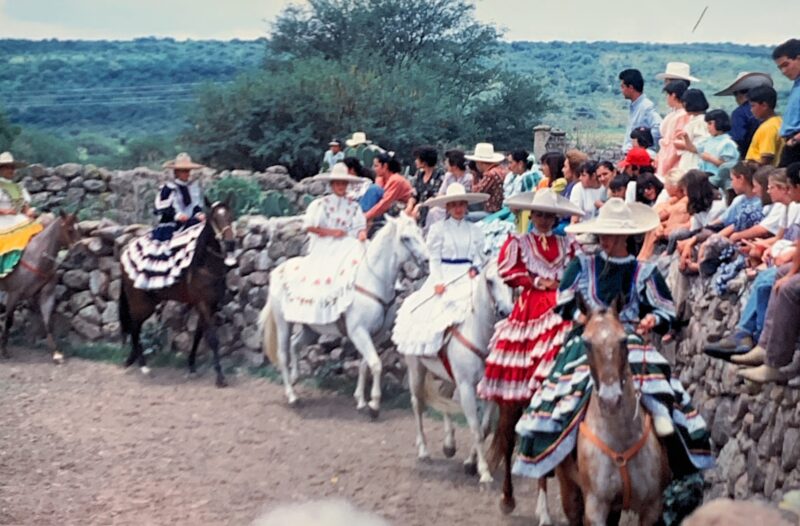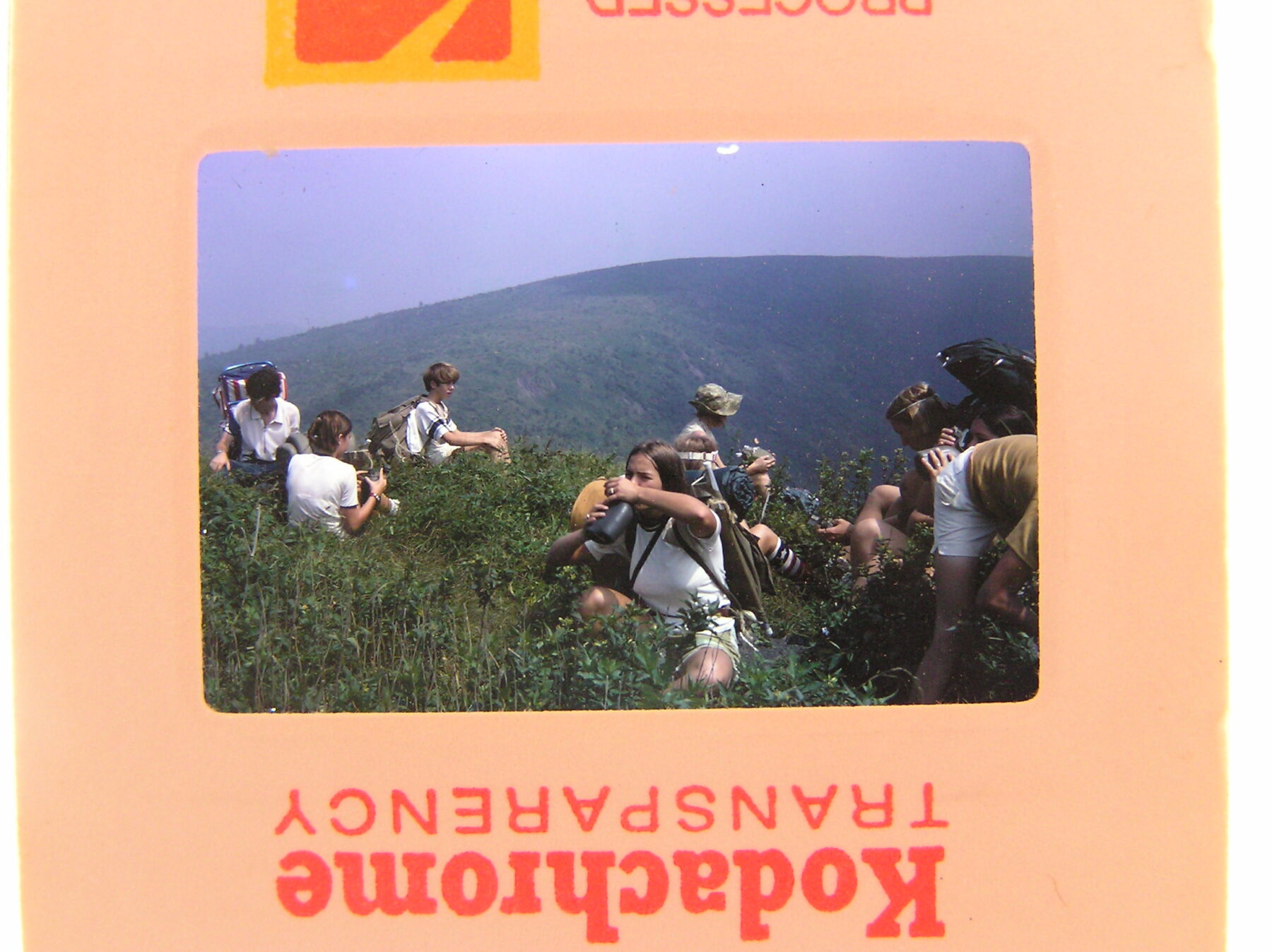By Andrew Nelson, Assistant Camp Director and Hante Coordinator, & Ed Haubenreiser, Hante and Outdoor Program Manager
Summer, 1972…
Thirteen teenagers and one young instructor…
Enlisting AT thru-hikers to help find a runaway camper…
Thus unfolded the first day of the first Hante. Helen Waite, founder of what is now called Hante Adventures and leader of said trip, recalled this day with an irrepressible smile. “I think the biggest challenge, at first, was understanding how hard it would be,” she admitted. “I thought I would just take these kids out there and do it!”
The seeming simplicity of the venture may be attributed to the program’s philosophical underpinnings. Raised on global expeditions with her paleontologist father, Helen remembers a time when Eagle’s Nest owned no backpacks or even a hatchet, leading her to launch the Explorers Club at Camp. She envisioned opportunities for youth to experience journeys that could be likened to a walkabout, in which simple living in the natural world could facilitate self discovery. Learning about a place while living in a small community would lay the groundwork for helping youth shape their trajectories in life. “The joy of place was a big aim,” said Helen, “and paleontology as a focus” helped to provide a lens of learning about that place’s history.



Journeys into Pisgah National Forest and Shining Rock Wilderness with the Club soon illuminated the need for a program exclusively for teens. Well equipped with maturity acquired during this formative period in their lives, teens were well suited to tap into the potential of the Club’s philosophy. Outward Bound in North Carolina was providing logistically similar programming in the area, but from a perspective that embodied the more adventurous aspects of expeditions. Combining Outward Bound-type itineraries and protocols (and oftentimes sharing staff) with the walkabout philosophy rendered the infrastructure for the first Hante Adventure on the Appalachian Trail.
“There was some arrogance,” Helen laughed. That first trip was greatly informative in realizing the need for co-leaders and in focusing on the socioemotional development of participants. Learning from experience and taking appropriate action, Helen began to build the program year by year.
The educational element soon matured into a robust curriculum that was built around the Four Corners of Hante Adventures: Physical, Community, Sense of Self, and Expansion of Mind. Well before convening as a group, participants would receive a list of research topics related to the area of their trip. Each participant would study their chosen topic before the trip, explore and learn more while living in the place itself, and then present their findings to the group while on the course. “They were welcome to provide day-long presentations if they wanted, and hopefully each one would lead to bigger discussions around questions that would arise,” explained Helen. Leaders were tasked with providing a focused and safe learning environment: they modeled the importance of the process of finding answers, rather than the need to know everything. Thus, the aim was to develop a yearning to experience other cultures, communities, and places as a way of broadening self perspective and enhancing community engagement.
Over time, Hante Adventures expanded beyond the Southern Appalachians and into the West, first to Canyon de Chelly in Arizona, and then to Mexico. Fifteen years visiting the same close-knit community provided a deeply rooted relationship between the program and a place. Teens were able to immerse themselves in the culture for three or four weeks, with the benefit of their leaders having knowledge of the local ways of living.
“We didn’t want to be tourists,” said Helen. “When you stay in one place for your entire journey, you’re no longer a tourist.” Participants would work alongside members of the community in daily chores such as collecting food and water, repairing buildings, cooking meals, and cleaning. This integration into community life demonstrated another aspect of the Hante Adventure philosophy. “We didn’t learn solely through reflection on these experiences. This was ‘soul work,’ which is difficult, interdisciplinary, active work,” said Helen.
The program continued to grow through the years, with new trips to other domestic and international locations. While these trips continued to fulfill the original Four Corners, they gradually incorporated outdoor skills to further enhance participant outcomes. Eagle’s Nest Camp Director Paige Lester-Niles led several Hante Adventures when she first joined the staff in the 1990’s before becoming the full-time Hante Adventures Director shortly thereafter. She fondly remembers leading her first trip with eight teens biking the Blue Ridge Parkway, and then moving such bike treks to trails. “We had bikes outfitted with heavy racks, suitable for the road, but when we took them down these rugged trails the racks would just break,” Paige explained. “We were constantly splinting them back together!”
Implementation of outdoor technical skills have allowed participants to engage in the place-based learning of the first Hante Adventure from a unique perspective. Participants are now traveling to different places, living simply, gaining local knowledge, and learning about themselves by way of canoe, bike, rope, or feet. The learning and the practicing of these skills allowed participants to further connect to their surroundings while also challenging themselves intrapersonally and interpersonally.
A bike trek from the mountains to the coast of California was an experience that particularly stood out to Paige, noting how the elevation changes on a fully packed bike moved participants far out of their comfort zones, but finishing a difficult day by sleeping outside under coastal redwoods put everything into perspective. “That encompassed the core of our philosophy,” said Paige, “challenging yourself, figuring out how to work together as a group, reflecting on lessons learned, and connecting to nature through all of it.” She also pointed to a moment when a girl from San Francisco saw lightning bugs for the first time while hiking on the Appalachian Trail, and a quieter participant sharing their botany knowledge with the group while backpacking on a trail.
Moments like these reinforce the initial vision of Hante Adventures as an opportunity for teens to go through a process of self-discovery. “Then and today, it remains important for teens to have that challenging opportunity, to have a rite of passage,” said Paige. Whether it is living within a different culture of a small community, or navigating the uncertainty of a whitewater section of river, Hante Adventure participants have continued to be challenged in order to learn, develop, and broaden their perspective through place. As a result, many can attest that traveling away from the familiar with a new group of people, and learning lifelong skills along the way, has had a profound impact on senses of self and life trajectories.
